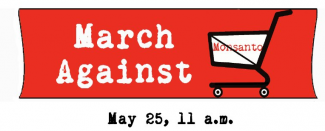
Rally today in San Diego and nationwide seeks to stop “Monsanto Protection Act 2.0”
By Miriam Raftery
May 25, 2013 (San Diego)—Food safety activists will hold a “March Against Monsanto” today at 11 a.m. in San Diego. (Details on their Facebook page.) Among other things, protesters oppose stealth language slipped into the 2013 Farm Bill approved by the House Agricutlrual Committee. The language revokes rights of states to pass laws requiring labeling of foods with genetically labeled ingredients.
“Monsanto is trying to manipulate Congress to pass a Far Bill that will wipe out citizens’ rights to state laws intended to protect their health and safety,” the Organic Consumers Association said, International Business Times reported.
The bill goes beyond genetically modified foods. Heather White, executive director of the Environmental Working Group, warns the bill’s broad language would “severely undermine all states’ authority to set standards for environmental protection, food safety or animal welfare. It would apply to genetically engineered food labeling, Concentrated Animal Feeding Operations (CAF) regulation, antibiotics use in meant and in other local and state food and farm regulations.”
This isn’t the first time Monsanto has come under fire for its tactics in Washington D.C.. Last Year, Monsanto spent over $6 million on lobbying, Open Secrets reported. It paid off; a measure dubbed the “Monsanto Protection Act” was signed into law by President Barack Obama. That law allows Monsanto to keep selling genetically engineered seeds even if a federal court finds they may pose a health risk.
The language was written and slipped into a bill anonymously, passed without review by key committees. According to a Salon.com article, most members of Congress weren’t even aware of the provision in the spending bill, HR 933, when they voted to prevent a government shut down. Though the measure is only in effect for six months, as a stopgap measure, the move has triggered a political backlash.
That hasn’t stopped Monsanto from moving forward with what some call the “Monsanto Protection Act 2.0”, the Farm Bill amendment by Iowa Republican Steve King to ban states from allowing consumers to know if genetically modified organisms (GMOs) are in the foods they buy. Some medical studies suggest that GMOs may cause kidney and liver damage, as well as reproductive harm. Since GMOs were introduced, cases of certain chronic illnesses and conditions consistent with the problems listed above have increased sharply. Monsanto has insisted, however, there is no evidence that GMOs harm health.
Meanwhile, more than 70% of some grain crops grown in the U.S. are now harvested from GMO seeds and GMO ingredients are in the majority of processed foods sold.
California voters narrowly defeated a GMO food labeling bill in 2012; it’s backers have vowed to try again. In Vermont and Connecticut, legislation is moving forward to require GMO labeling. So Monsanto seeks to avoid state by state battles, instead banning such laws nationally.
Senator Jeff Merkley is demanding a floor vote to repeal the GMO labeling ban in the Farm Bill.
Others have criticized the administration for appointing former Monsanto executives and lobbyists to key positions in the U.S. Department of Agriculture and the Food & Drug Administration.
MoveOn, an activist group, has amassed more than 14,000 signatures on a petition protesting the King amendment and asking Congress to “Stop the Monsanto Riders:: http://petitions.moveon.org/sign/stop-the-monsanto-rider Another seeks to repeal the “Monsanto Protection Act”: http://petitions.moveon.org/sign/repeal-the-monsanto-protecti-1 . MoveOn has also circulated a petition asking the President to cease the FDA’s ties to Monsanto: http://petitions.moveon.org/sign/tell-obama-to-cease-fda
1. "Lobbying Spending Database—Monsanto Co, 2013," OpenSecrets.org, accessed May 21, 2013
http://www.opensecrets.org/lobby/clientsum.php?id=D000000055
"How the Monsanto Protection Act snuck into law," Salon, March 27, 2013
http://www.moveon.org/r?r=290195&id=68363-18012818-eQIk6Cx&t=4
2. "'Monsanto Protection Act 2.0′ Would Ban GMO-Labeling Laws At State Level," International Business Times, May 20, 2013
http://www.moveon.org/r?r=290225&id=68363-18012818-eQIk6Cx&t=5

















Recent comments